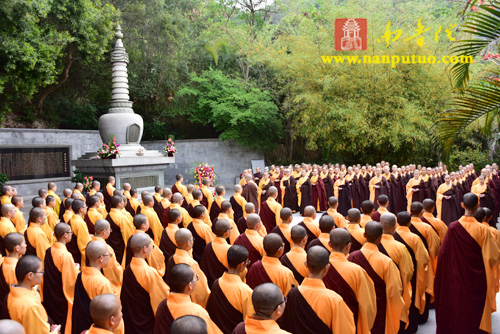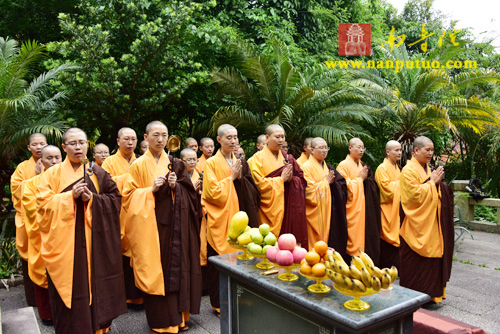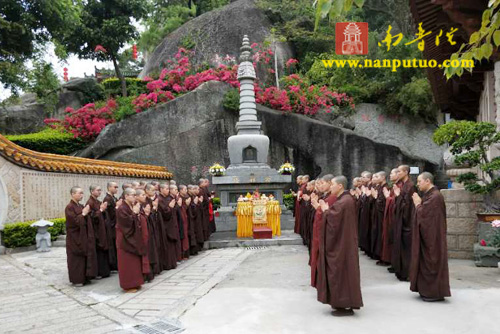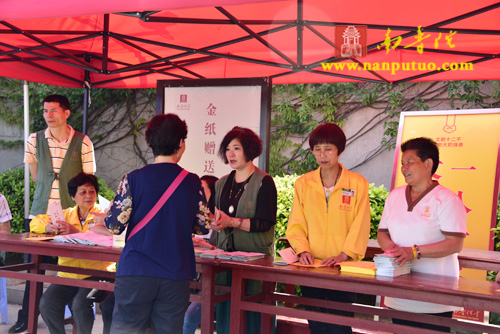On 5th April 2018 (20th of the second month in the Lunar Calendar), the traditional day of Qing Ming Festival (commemoration of ancestors and dead friends) was held. Nanputuo Temple and the Buddhist College of Minnan, in Xiamen held a solemn commemoration of ancestor activity to offer and clean the Stūpa in order to apply practical actions to express the commemorational feeling on the departed nobles and masters.
At 7:30 a.m., the Most Ven. Ze Wu compassionately appointed the following venerable as the main leaders to host the activities. Ven. Hui Ran (Chief Monk and Chief Temple superintendent), Ven. Jie Xiang (Chief monk and Temple Supervisor, the Executive Vice-rector of BCM), Ven. Zhi Chang (Hall Lord), Ven. Miao Zhen (Hall Lord and Monastic manager), Ven. Fa Yuan (Temple superintendent, Vice-rector of BCM), led the residential monastic, both the divisions of monks and nuns, and all the teachers and students went to the Stūpas of ancestors and also the meritorious Hall to offer the ancestors, and had recitation and blessing ritual. During the period of these activities, the Saṃgha sincerely recited Sūtra with clear and wondrous sound to express their great gratitude towards the former masters and nobles, and also transferred merit for world peace, prosperous country and security of people, good weather, and everlasting of Dharma.
In order to facilitate the demand of a large number of Buddhists and general people to commemorate their ancestors; from 2nd April to 13th April, Nanputuo Temple set up – commemoration of ancestor, returning gratitude, deliverance of sentient being ritual – the monastics led the people to recite the "Kṣitigarbha-bodhisattva-pūrva-praṇidhāna Sūtra" and held a solemn offering, and offering food to dead ritual, etc. During the period of Dharma activities, more than one hundred thousand Buddhists and lay people visited the Nanputuo Temple to offer and venerate their ancestors and commemorate their departed relatives or friends.
A general knowledge of Qing Ming Festival (commemoration of ancestors)
1. The origin of Qing Ming Festival
In fact, the origin of Qing Ming has a long history which has two sayings: (1) the ceremony of the ancient tomb of Emperor was imitated by the people. On that day, they were sweeping their ancestor tombs, and later this lineage practice has become a traditional custom; (2) in order to commemorate the loyalty of Jie Zhitui, Duke Wen of Jin (Jin Wengong) set the day after the Cold Food (Hanshi Festival) as Qing Ming Festival during the Spring and Autumn Period. Between the period of Qin or Han, ancient astronomer of China fully established the twenty four solar terms, "Qing Ming (clear and bright) is also associated with the characteristics of weather conditions. Beside commemorating or honoring the ancestors, various customs related to Qing Ming have gradually developed and continued till today.
2. The definition of commemoration of ancestors on Qing Ming
The commemoration of ancestors of Qing Ming tradition has a profound origination and the cardinal meaning intents to teach the people that they should not forget their root or origin. It edifies the descendants with the concept of filial piety and gratitude. Through engaging in the activities of Qing Ming, we remember the spirit of ancient great nobles, carry on the will of ancestors, and continue the spirit of ancestors to transmit from generation to generation.
3. The relationship between Qing Ming and Buddhism
"Rectified Commandment of Ven. Bai Zhang by Imperial Order" stipulated: On Qing Ming day, the ancestral halls, ancestral towers, and the Stūpas of ancestors, ancestral temples, the accountant and executive officers of the monastery need to clean all the above places, and rigorous preparation of offering food, and all the people gathered to recite the Sūtra together, and the monastery made an announcement to prohibit – cutting trees in the mountain, plucking bamboo shoots or tea leaves – in order to let everything grow. It is clear that Qing Ming is highly valued by Buddhism. On that day of Qing Ming, both Chan masters Ven. Zong Mi (Tang Dynasty) and Ven. Fa Yuan (Song Dynasty) preached Dharma and gave lectures to benefit the people. In general, the Buddhists engaged in the activities such as cleaning the Stūpas, reciting Sūtras, and prohibiting of doing cutting or other activities to commemorate the former nobles and great masters. They also remember the gratitude of the devotees, save the human beings, and compassionately protect the living beings. Since many years, they have been complying with the spirit of loving kindness and compassion in monastery to participate the Qing Ming Festival.
4. The traditional custom value is emphasized by China
The traditional custom is the fundamental concept of nation and it also is an important interpretation of Nation's spirit. Before 2008, China has announced Qing Ming Festival as a public holiday which shows the importance of traditional custom. Since the 18th National Congress, China has applied a central documentary to show the importance and define the greatness of the former traditional custom. They emphasized the propagation of traditional custom, and utilized its function. In fact, it has a very important practical and historical meaning.
While we propagate the traditional custom, we also need to pay attention to the integration with the new era. In recent years, Nanputuo Temple advocated the "Civilized commemoration of ancestor" which is supported by many Buddhists and public. Especially this year, numerous Buddhists and lay people used a piece of paper money to substitute a great amount of paper money, used a stick of incense to replace huge bunch of incense, and used fresh flowers and fruits to offer in order to reduce the pollution and protect the environment. Indeed, they apply green environmental protection and low carbon method to commemorate the ancestors; consequently, it not only reduces wasting resources but also reduce the pollution of environment; simultaneously, it fully expresses the sincere mind of filial piety.
1. Ven. Hui Ran led the Dharma Ritual






2. Ven. Jie Xiang led the Dharma Ritual




3.Ven. Zhi Chang led the Dharma Ritual




4.Ven. Miao Zhen led the Dharma Ritual











